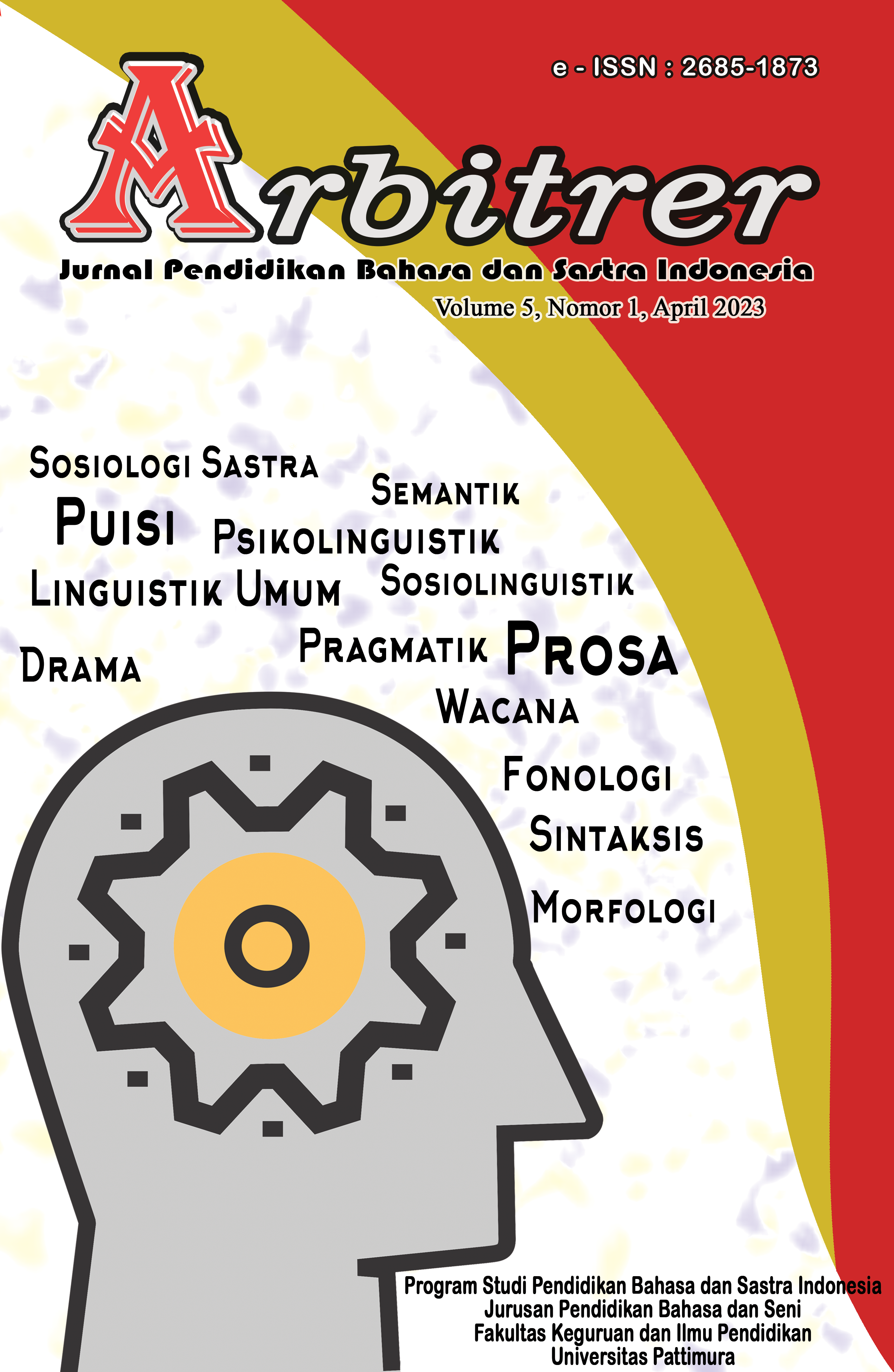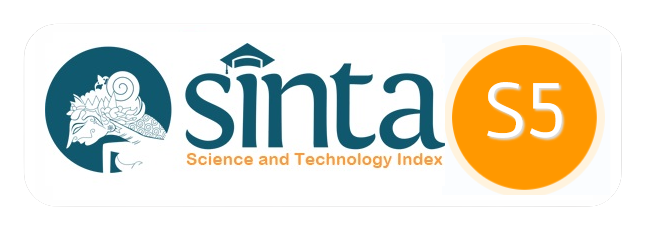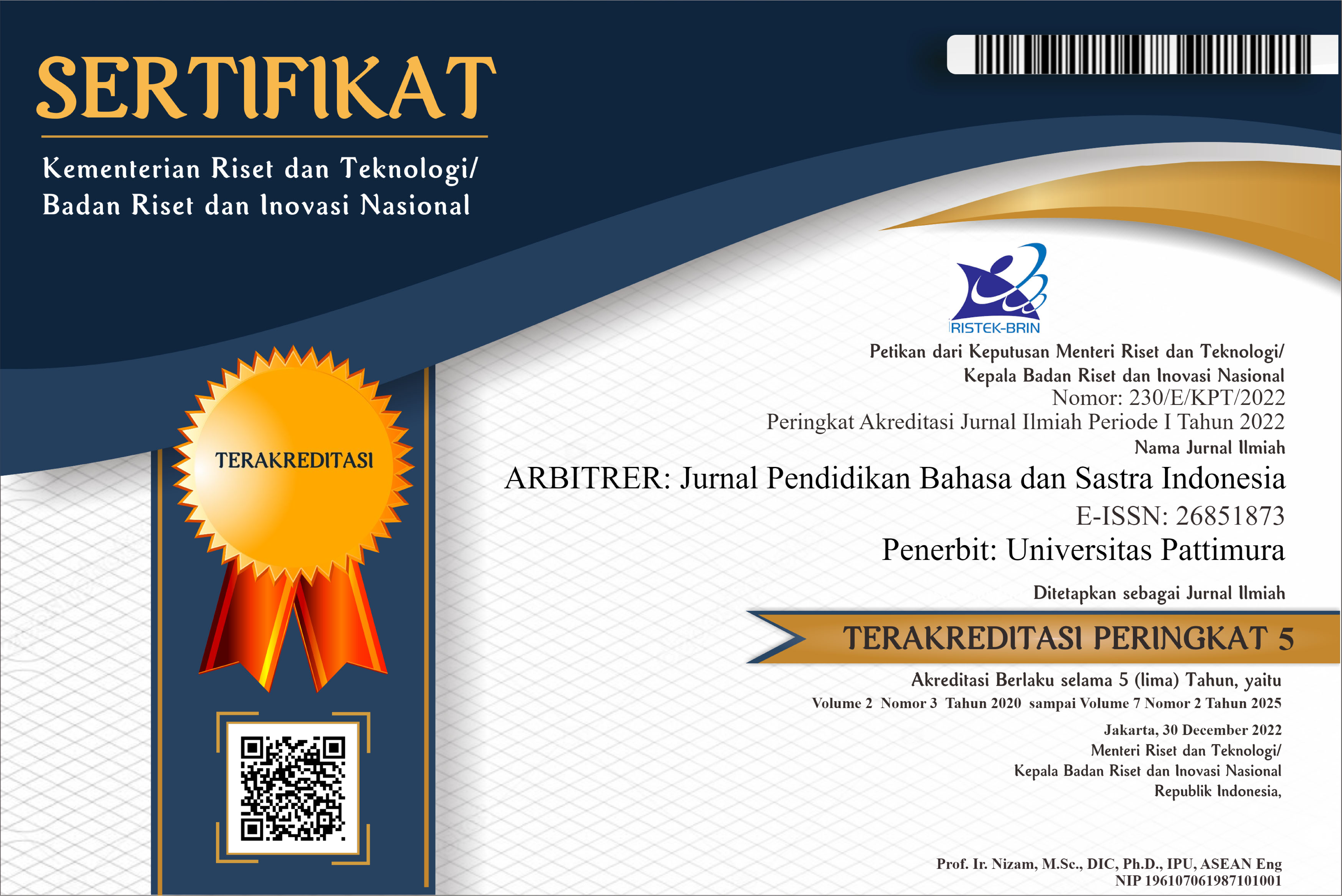DESAIN DAN PENERAPAN MODEL PEMBELAJARAN BERBASIS PROYEK DALAM PEMBELAJARAN BAHASA
Abstract
Makalah ini menyajikan kerangka desain pembelajaran berbasis proyek (PjBL) berdasarkan kajian pustaka secara komprehesif dari berbagai hasil penelitian yang berhubungan dengan penerapan PjBL khususnya di bidang pembelajaran bahasa. Data diperoleh dari Google Scholar, dan ProQuest dengan menggunakan beberapa kata kunci. Selain itu, sumber data juga berasal dari buku, jurnal, dan prosiding. Uji validasi model teoritis dari struktur desain PjBL menggunalkan confirmation factor analysis (CFA) dikaitkan dengan faktor keterlibatan siswa. Hasil test validasi adalah .800 menjunjukan kegunaan kerangka ini dalam pembelajaran Bahasa. Untuk mendemonstrasikan penerapan kerangka design PjBL dalam pembelajaran Bahasa, makalah ini menyampaikan satu contoh proyek
beserta aktivitas pembelajaran di kelas.
Downloads
References
Barron, B., & Darling-Hammond, L. (2008). Teaching for Meaningful Learning: A Review of Research on Inquiry-Based and Cooperative Learning. Book Excerpt. ERIC. https://doi.org/ED539399.
Bell, S. (2010). Project-Based Learning for the 21st Century: Skills for the Future. The Clearing House: A Journal of Educational Strategies, Issues and Ideas, 83(2), 39–43. https://doi.org/10.1080/00098650903505415.
Blumenfeld, P. C., Soloway, E., Marx, R. W., Krajcik, J. S., Guzdial, M., & Palincsar, A. (1991). Motivating Project-Based Learning: Sustaining the Doing, Supporting the Learning. In Educational Psychologist (Vol. 26, Issues 3–4, pp. 369–398). https://doi.org/10.1080/00461520.1991.9653139.
Chang, C. C., & Tseng, K. H. (2011). Using a web-based portfolio assessment system to elevate project-based learning performances. Interactive Learning Environments, 19(3), 211–230. https://doi.org/10.1080/10494820902809063.
Coffin, P. (2013). The Impact of the Implementation of the PBL for EFL Interdisciplinary Study in a Local Thai Context. The 4th International Research Symposium on Problem-Based Learning (IRSPBL) 2013, 191–197. http://vbn.aau.dk/ws/files/80414158/samlet_1_.pdf.
Cudney, E., & Kanigolla, D. (2014). Measuring the impact of project-based learning in Six Sigma education. Journal of Enterprise Transformation, 4(3),272–288. https://doi.org/10.1080/19488289.2014.930546.
Ertmer, P. A., & Simons, K. D. (2005). Scaffolding teachers’ efforts to implement problem-based learning. International Journal of Learning, 2000–2005. http://www.edci.purdue.edu/ertmer/docs/Ertmer-LC05.pdf.
Felder, R. M., & Brent, R. (2005). Understanding Student Differences. Journal of Engineering Education, 94(1), 57–72. http://www4.ncsu.edu/unity/lockers/users/f/felder/public/Papers/Understanding_Differences.pdf.
Fine, G. S. (2011). No Title. In G. David (Ed.), Fostering Autonomy in Language Learning (pp. 52–63). Zirve University. https://www.researchgate.net/profile/David_Gardner5/publication/259368185 _Fostering_autonomy_in_language_learning/links/00b4952b3e83c75399000 000/Fostering-autonomy-in-language-learning.pdf.
Foss, P., Carney, N., Mcdonald, K., & Rooks, M. (2007). Project-Based Learning Activities for Short-Term Intensive English Programs. Asian EFL Journal, 1–19.
Fragoulis, I. (2009). Project-Based Learning in the Teaching of English as A Foreign Language in Greek Primary Schools : From Theory to Practice. English Language Teaching, 2, 113–119.
Frank *, M., & Barzilai, A. (2004). Integrating alternative assessment in a projectbased learning course for pre-service science and technology teachers.
Assessment & Evaluation in Higher Education, 29(1), 41–61. https://doi.org/10.1080/0260293042000160401.
Fushino, K. (2011). Students’ reactions to a group project in a university Englishas-a-foreign-language class for cultural understanding. Intercultural Education, 22(4), 301–316. https://doi.org/10.1080/14675986.2011.617423.
Grant, M. M. (2011). Learning, Beliefs, and Products: Students’ Perspectives with Project-based Learning. Interdisciplinary Journal of Problem-Based Learning, 5(2), 37–69. https://doi.org/10.7771/1541-5015.1254.
Grant, M. M., & Maribe Branch, R. (2005). Project-based learning in a middle school: Tracing abilities through the artifacts of learning. Journal of Research on Technology in Education, 38(1), 65–98. https://doi.org/10.1080/15391523.2005.10782450.
Gülbahar, Y., & Tinmaz, H. (2006). Implementing project-based learning and Eportfolio assessment in an undergraduate course. Journal of Research on Technology in Education, 38(3), 309–327. https://doi.org/10.1080/15391523.2006.10782462.
Hayes, D. (2012). Planning for success: Culture, engagement, and power in English language education innovation. In Tribble, Ch (Ed.), Managing Change in
English Language Teaching: Lesson from Experience (pp. 47-60). British Council.
Johnson, A., & Heffernan, N. (2006). The short readings project: A CALL reading activity utilizing vocabulary recycling. Computer Assisted Language Learning, 19(1), 63–77. https://doi.org/10.1080/09588220600804046.
Jones, R. D., & Consultant, S. (2008). Strengthening Student Engagement *
Engagement-Based Learning and Teaching Approach International Center for Leadership in Education International Center for Leadership in Education. November, 1–10.
Kaldi, S., Filippatou, D., & Govaris, C. (2011). Project-based learning in primary schools: Effects on pupils’ learning and attitudes. Education 3-13, 39(1), 35–47. https://doi.org/10.1080/03004270903179538.
Ke, L. (2010). Project-based College English : An Approach to Teaching NonEnglish Majors. Journal of Applied Linguistics, 99–112.
Klein, J. I., Taveras, S., King, S. H., Commitante, A., Curtis-Bey, L., & Stripling, B. (2009). Project-Based Learning: Inspiring Middle School Students to Engage in Deep and Active Learning.
Korosidou, E. I., & Griva, E. A. (2013). “My Country in Europe”: A Content-based Project for Teaching English as a Foreign Language to Young Learners. Journal of Language Teaching and Research, 4(2), 229–243. https://doi.org/10.4304/jltr.4.2.229-243.
Larmer, J., & Mergendoller, J. R. (2010). Seven Essentials for Project-Based Learning. Educational Leadership, 68(1), 34–37.
Maruanaya, H. J. (2018). Multiple Intelligences and Group’s Performance in TEFL Projects. The Asian EFL Journal, 20(5), 72–77. https://www.asian-efljournal.com/monthly-editions-new/2018-teaching-articles/volume-20-issue-5-2018.
Mergendoller, J. R., Maxwell, N. L., & Bellisimo, Y. (2006). The Effectiveness of Problem-Based Instruction: A Comparative Study of Instructional Methods and Student Characteristics. Interdisciplinary Journal of Problem-Based Learning, 1(2), 11–17. https://doi.org/10.7771/1541-5015.1026.
Michael, J. (2006). 2006-Where’s the evidence that active learning works. Advances in Physiology EducationPhysiology Education, 30, 159–167. https://doi.org/10.1152/advan.00053.2006.
Murray, N. (2012). English as a lingua franca and the development of pragmatic competence. ELT Journal, 66(3), 318–326. https://doi.org/10.1093/elt/ccs016 Perin, D. (2011). Facilitating student learning through contextualization: A review of evidence. Community College Review, 39(3), 268–295. https://doi.org/10.1177/0091552111416227.
Ravitz, J. (2010). Beyond changing culture in small high schools: Reform models and changing instruction with project-based learning. Peabody Journal of
Education, 85(3), 290–312. https://doi.org/10.1080/0161956X.2010.491432
Richards, J. C., Rodgers, T. S., Gibbes, M., Carson, L., John, L., Mikulec, E., Miller, P. C., Holm, M., Dooly, M., Masats, D., Chen, M., Lucas, G., Bell, S., Tims, N. R., Garcia, H. W. R., Mills, N., Larmer, J., Ross, D., Education, B. I. for, … Fried-Booth, D. (2002). Collections of Articles. ELT Journal, 59(2), 46–70. https://doi.org/10.1002/j.1949-3533.2000.tb00242.x
Schneider, D. K., & Synteta, P. (2005). Conception and implementation of rich pedagogical scenarios through collaborative portal sites. Icool 2003, 243–268.
Simpson, J., English, B. a, & Linguistics, M. a A. (2011). Integrating Project-Based Learning in an English Language Tourism Classroom in a Thai University Submitted by. Ethics, May.
Smith, K. A., Sheppard, S. D., Johnson, D. W., & Johnson, R. T. (2005). Pedagogies of Engagement: Classroom-Based Practices. Journal of Engineering Education, 94(1), 87–101. https://doi.org/10.1002/j.2168-9830.2005.tb00831.x Stewart, R. a. (2007). Investigating the link between self directed learning readiness
and project-based learning outcomes: the case of international Masters students in an engineering management course. European Journal of Engineering Education, 32(4), 453–465. https://doi.org/10.1080/03043790701337197.
Stoller, F. L. (1997). Project Work: A means to Promote Language and Content. English Teaching Forum, 35(4).
Thomas, J. W. (2000). A Review of Research on Project-Based Learning. https://doi.org/10.1007/s11528-009-0302-x
Copyright (c) 2023 Hendrik Jacob Maruanaya

This work is licensed under a Creative Commons Attribution-NonCommercial-ShareAlike 4.0 International License.











3.png)


